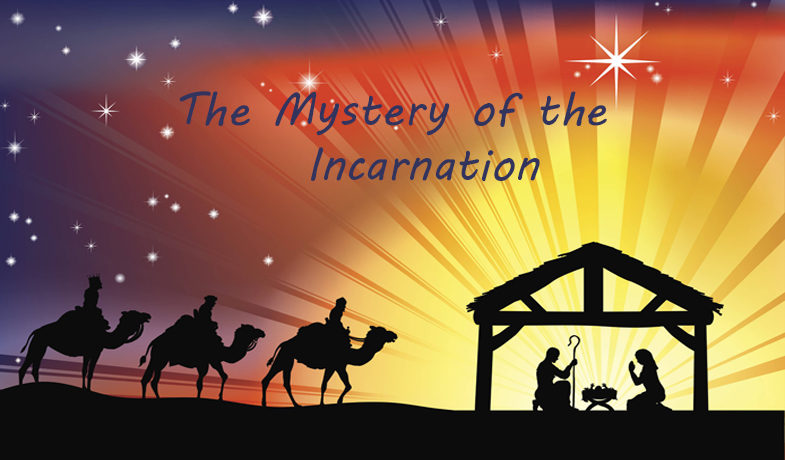The Mystery of the Incarnation
Christmas is about the Creator of the universe, who is not Himself part of the universe, but who moved Himself in the person of his Son, into the universe that He made.
Deuteronomy 29:29 The secret things belong to the LORD our God: but those things which are revealed belong to us and to our children forever, that we may do all the words of this law.
This verse reminds us, the church, and as individuals of the responsibility of the covenant community to focus on the things that God has revealed.
As we focus on God’s revelation to us, we must admit that some things are always hidden from our eyes. We really do not understand, for instance, the relationships between time and eternity. Nor do we have much of an idea as to how the God who inhabits eternity discloses Himself to us in our finite, space/time history.
It is evident that God has revealed things to us. We have various words to describe certain elements of this disclosure, for example, the Incarnation. We really do not know how He did that, we do not fully know how God can be both personal and sovereign/transcendent. We cannot comprehend just how the one God can be three in one.
In none of these cases is this a subtle appeal to ignorance, or an irresponsible hiding behind the irrational or the mystical. When we admit, indeed, insist, that there are mysteries about these matters, we do not admit they are nonsensical or self-contradictory. Rather, we are saying that we do not know enough, and we admit our limits. What God has not disclosed of Himself we cannot know.
The secret things belong to God.
Because of the contrast in the biblical text, the implication is that it would be presumptuous to claim we do know, or even to spend too much time trying to find out—lest we should be presuming on God’s exclusive terrain. Some things may be temporarily hidden to induce us to search.
Proverbs 25:2 tells us it is the glory of God to conceal a matter, and the glory of kings to search a matter out, to get to the bottom of things. But that is not a universal rule applying to all in life: the very first sin involved trying to know some hidden things and thus be like God. In such cases, the path of wisdom is reverent worship of Him who knows all things, and careful adherence to what He has graciously disclosed.
The Sacred Mystery of His Birth
John 1:1 In the beginning was the Word, and the Word was with God, and the Word was God. 1:2 The same was in the beginning with God. 1:14 And the Word was made flesh, and dwelled among us, (and we beheld His glory, the glory as of the only begotten of the Father,) full of grace and truth.
We will have no difficulty with the Incarnation if we believe in creation. If we can get past Genesis 1:1, we’re home free concerning miracles. “In the beginning God created the heaven and the earth.” Genesis 1:1
1 Timothy 3:16 And without controversy great is the mystery of godliness: God was manifest in the flesh, justified in the Spirit, seen of angels, preached to the Gentiles, believed on in the world, received up into glory.
God was manifest in the flesh. We call this the Incarnation, justified in the Spirit, seen of angels. Through all eternity, the eons of the ages, no angel had ever seen God until Jesus was born.
In the gospel of John we are shown that the Word, Christ, is God’s agent of creation. The Word was ‘in the beginning.’ There never was a time when Jesus did not exist. This is hard for us to grasp.
There is no Christianity without the Incarnation.
John 1:14 And the Word was made flesh, and dwelled among us, (and we beheld his glory, the glory as of the only begotten of the Father,) full of grace and truth.
The Word, God’s very self-expression, who was both with God and who was God, became flesh: He donned our humanity, without our sin. God chose to make Himself known, finally and ultimately, in a real, historical man. When “the Word became flesh,” God became man.
Jesus the Word, pitched His tabernacle, or lived in his tent, among us. This term would call to mind the tabernacle where God met with Israel before the temple was built. Exodus. 25:8. But now, through Jesus birth, God has chosen to dwell among His people in a yet more personal way.
Luke 1:37 “For nothing will be impossible with God.” Gabriel says this to Mary as the bottom line answer for how God can become man. He had been preparing the world for this impossibility for thousands of years. The testimonies: Genesis 18:14 Is anything too hard for the LORD? Job 42:2 I know that you can do all things, and that no purpose of yours can be thwarted. Jeremiah 32:17 Ah, Lord GOD! It is You who has made the heavens and the earth by Your great power and by Your outstretched arm! Nothing is too hard for you.
The Incarnation/The Great Mystery
Then the time came for the most impossible thing to be done: God entered His creation as part of it, and without ceasing to be the uncreated God—The Incarnation.

